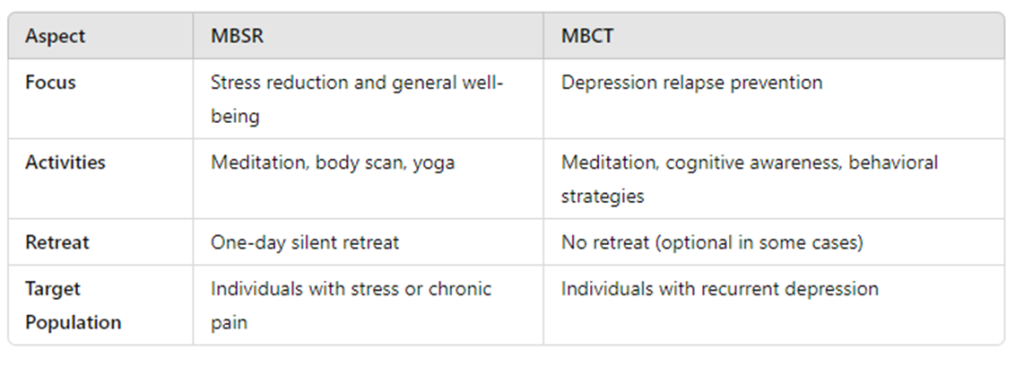Mindfulness is the practice of focusing on the present moment, awareness of one’s thoughts, feelings, bodily sensations, and environment. It emphasizes acceptance, encouraging individuals to observe without judgment. Commonly practiced through meditation, it is also integrated into daily activities such as eating, walking, or working.
Seems hard?
Yes, it is… but it’s not impossible.
You must be thinking why so much emphasis on focusing on the present..
Because it has a lot of health benefits.
1. Mental Health Improvement:
- Stress Reduction: Mindfulness reduces stress by lowering cortisol levels, the stress hormone.
- Anxiety and Depression: Studies show mindfulness-based cognitive therapy (MBCT) is effective in reducing symptoms of anxiety and preventing depression relapse.

2. Physical Health Benefits:
- Pain Management: Mindfulness-based stress reduction (MBSR), helps individuals cope with chronic pain conditions.
- Improved Heart Health: Regular practice has been linked to lower blood pressure and reduced cardiovascular risks.

3. Enhanced Cognitive Function:
- Mindfulness improves focus, attention, and memory by encouraging present-moment awareness and reducing mind-wandering.

Applications in Healthcare:
Mindfulness-Based Stress Reduction (MBSR): Developed by Dr. Jon Kabat-Zinn, MBSR is an eight-week program, weekly sessions lasting 2–2.5 hours, plus a one-day retreat around the sixth week. Participants are encouraged to commit to daily home practice of 30–45 minutes. Each session includes:
- Guided Meditation: Focus on body sensations, breath, or sounds to cultivate present-moment awareness.
- Body Scan Practice: A systematic focus on different parts of the body to enhance relaxation and mindfulness of physical sensations.
- Yoga Postures: Gentle, mindful movements aimed at increasing bodily awareness and flexibility.
- Group Discussion:
Mindfulness-Based Cognitive Therapy (MBCT): MBCT integrates mindfulness practices with cognitive-behavioral therapy to address depression and anxiety disorders. It’s an 8-week structure, with weekly sessions lasting 2–2.5 hours. Like MBSR, it involves daily home practice.
MBCT sessions integrate elements of mindfulness and cognitive therapy:
- Mindfulness Exercises: Practices like mindful breathing and body scans to anchor attention and observe thoughts nonjudgmentally.
- Cognitive Awareness Techniques: Teaching participants to recognize negative thought patterns and respond with curiosity and acceptance instead of automatic reaction.
- Behavioral Strategies: Encouragement to engage in activities that improve mood and counter depressive tendencies.

Practical Tips for Practicing Mindfulness:
- Start Small: Begin with five-minute breathing exercises or guided meditations.
- Consistency Matters: Practice daily, even if for a short time, to develop mindfulness as a habit.
- Use Technology: Apps like Headspace, Calm, or Insight Timer offer accessible ways to learn and practice mindfulness.
Mindfulness has proven to be a transformative tool for enhancing well-being. Whether used to manage stress, improve mental health, or cultivate greater awareness, mindfulness offers a simple yet powerful approach to living a healthier, more present life.
For more information on these programs, consult institutions like the Mindfulness Center at Brown University or the Oxford Mindfulness Foundation.

A meta-analysis published in JAMA Internal Medicine highlighted mindfulness meditation’s ability to alleviate symptoms of anxiety, depression, and pain. Neuroimaging studies have also demonstrated changes in brain areas associated with emotion regulation and attention, such as the prefrontal cortex and amygdala.
Despite its benefits, mindfulness is not a universal remedy. Some individuals may find the practice difficult or triggering, especially those with unresolved trauma. Professional guidance is recommended for therapeutic mindfulness practices.




